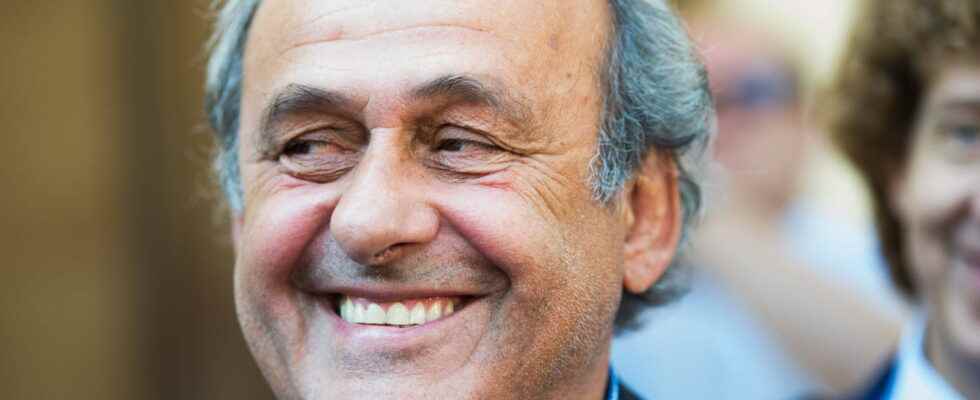On the floor since he is no longer president of UEFA, Michel Platini could become the future president of the FFF.
What if a legend of French football took the place of Noël Le Graët at the head of the FFF? If Michel Platini has been cited and accused several times in corruption cases linked to the awarding of the last World Cup in Qatar, the former number 10 of the Blues remains an essential person in the landscape of French football and recently even won his lawsuit against Sepp Blater (there was an appeal for release). According to several information and in particular Daniel Riolo on RMC, the former boss of UEFA would have been probed by President Emmanuel Macron to take control of French football.
“We learned on Sunday that a meeting with the ministry had been set, with Madame Oudéa-Castéra, for February 10. He is going to meet the minister. And we also know that on Sunday, contact was made between Emmanuel Macron, who has therefore completely dropped Noël Le Graët, and Platini. Emmanuel Macron sent a message and is testing the waters with Platini asking him if he would be available. In his way of saying no, which I know very humbly from Platini , it’s because in this wound that he has deep inside him, I think he would like us to come and get him, to call him. I think that’s why Emmanuel Macron has takes this step, and it will be supported by other policies.”
find out more
Biography of Platini
Before Zinédine Zidane, the France of football had Michel Platini. The same class with the ball, this art of caressing it and doing what it sees fit. The 1980s were his, when his genius was expressed with the green of Saint-Etienne, the white and black of Juventus Turin and the blue of the national team. But Platini’s story began in Lorraine. Son of an Italian immigrant father, professor of mathematics, and a mother, daughter of the owner of the sports café, he began his career in 1972 in Nancy, Metz not having believed in him. The seven years spent at the club will allow him to harden up and demonstrate both his qualities as a playmaker and scorer, diabolical on a free kick near the surface. Arrived in the final of the Gambardella Cup in 1974 with his father at the head of the Nancy team and his friend Olivier Rouyer at his side, Platini offers the Lorraine club the 1978 French Cup. His only gift before changing air and dimension by joining Saint-Etienne, rather than Nantes. His passage of three years remains contrasted but allows him to glean the national title in 1981.
His fate really changed in 1982 when he decided to leave France and sign for Juventus Turin. Platini, who comes out of a dazzling World Cup until the heartbreak of Seville (elimination in the semi-final against Germany 3-3 4-5 on pens), becomes resplendent there. Surrounded by talented players like Boniek with whom he will form an infernal duo, or Zoff, the Habs regale his partners with his inspirations as much as he martyrs the defenses. With the Bianconneri, he first reached the final of the Champions Clubs’ Cup where he finally failed against Hamburg. This is only a postponement. The one whom the Italian press described as an extraterrestrial took his club to win the Cup Winners’ Cup in 1984, before the following year to win the European Cup, scoring the only goal from the penalty spot. An edition that will remain as the tragedy of Heysel, a stand having collapsed causing the death of 39 supporters. King Michael, another transalpine qualifier, reigns over Italian and European football.
Because at the same time, the brilliant leader leads the French team in his wake. If he failed twice in the semi-finals of the World Cup (1982 and 1986), he shone at Euro 1984. In France, he scored 9 goals in the competition (a record) including a free kick entered in the legend in the final against the unfortunate Spanish goalkeeper Arconada.
Retired from the field in 1987, Platini remained in football and became coach of the France team from 1988 to 1992, without notable success. After having resigned from his post following the failure at the Euro, he joined the organizing committee of the 1998 World Cup. A springboard for the future. He became special adviser to Blatter, the new president of FIFA, before in 2001 becoming vice-president of the French Football Federation (FFF). Ambition and love of football pushed him to aim even higher and he was elected president of UEFA in 2007. Re-elected in 2011 and 2015, he took on the presidency of FIFA but was suspended for having received 1.83 million euros “unfairly” from Blatter. A case for which he will be cleared after numerous trials but which will have forced him to retire from football. Any legend that he is, Platini will not have been able to avoid tackles in the instances.
How old is Michel Platini?
Michel Platini was born in Joeuf in Meurthe-et-Moselle on June 21, 1955. He is now 67 years old.
Did Michel Platini win the Ballon d’Or?
The French playmaker is the first player in history to have been awarded the Ballon d’Or three years in a row between 1984 and 1986. Since then, only Lional Messi has done better (with four between 2009 and 2012).
Michel Platini has been married since December 21, 1977 to Christèle Bigoni and has two children: Laurent, born in 1979, and Marine, born in 1980.
